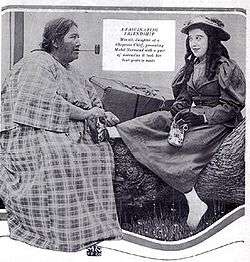Minnie Devereaux
| Minnie Devereaux | |
|---|---|
 Devereaux and Mabel Normand. From the Mack Sennett Weekly, 1917 | |
| Born |
1891 Canada |
| Died | 1984 (aged 92–93) |
| Other names |
Indian Minnie Minnie Ha-ha Minna Prevost Minnie Prevost |
| Occupation | Actress |
| Years active | 1913–1923 |
Minnie Devereaux (1891–1984) was a Canadian silent film actress. Also known as "Indian Minnie," or "Minnie Ha-Ha," Devereaux held at least 14 roles, beginning in 1913 with Old Mammy’s Secret Code and ending with the 1923 release of The Girl of the Golden West.[1] Devereaux was a Cheyenne, the daughter of Chief Plenty Horses.[2]
Early life
Devereaux studied at Carlisle Indian Industrial School, a Pennsylvania boarding school for Native American students.[3]
Early career
Fatty and Minnie He-Haw
Devereaux starred alongside Roscoe Arbuckle in the 1914 silent comedy film Fatty and Minnie He-Haw, directed by Arbuckle. Devereaux is featured as a Native American, whom Arbuckle reluctantly marries after being rescued by her tribe. Arbuckle pursues a white woman in town, played by Minta Durfee, but is driven back when Devereaux discovers his disloyalty. Outraged, the tribe prepares to burn him for his traitorous behavior, but Devereaux spares him in an act of love.[4]
Other works
Devereaux worked with producer and "king of comedy" Mack Sennett on Fatty and Minnie He-Haw, as well as the 1918 film Mickey and the 1922 film Suzanna, both films directed by F. Richard Jones. In 1920 Minnie worked with director James Cruze on the film Food for Scandal, the cinematic version of Paul Kester's play A Picture of Rare Delight.[5] Devereaux was an actress in high demand, working with various production companies on the east coast, including Kay-Bee Pictures, New York Motion Picture, and Sennett's Keystone Studios.[3][6]

Controversy
Despite being heralded as a dignified professional, Devereaux suffered through racial tension in a controversial 1910s America.[3]
Devereaux was subject to typecasting, holding roles that often made fun of her weight, and her Native American heritage.[3] She is often referred to as a squaw, a derogatory slur for Native Americans, both in reviews and in reference to her characters' titles within such films.[3] Peter Milne, a film critic and eventual screenwriter, berated Deveraux for her age and appearance, calling her "ancient" in his review of Mickey; Devereaux was only 27 years old at the time of the film's release.[7]
An article in Photoplay details an encounter between Devereaux and a belligerent white woman. On a crowded street car, the woman intentionally took up available space in order to prevent Devereaux from sitting nearby. Devereaux interrupted the conductor of the street car, who insisted that the woman move her belongings, saying that she would rather stand than to sit next to such a woman.[3]
Despite this unease, many in the film business were aware of, and respected Devereaux's wit, dignity, and talents as an actress. Motion Picture Magazine recounts a chance encounter between Devereaux and actor Bertram Grassby, who commented on the actress' persona:[8]
During the conversation, the name of Minnie, a fat, old Indian woman who has almost become a moving picture institution, was mentioned and he commented laughingly on her way of always saying and doing the unexpected thing.— Beth Trepel, "A Dryadic Dramatist", Motion Picture Magazine
The encounter involved Grassby tipping his hat toward Devereaux, which prompted her to question the meaning of the act.[8] Devereaux often poked fun at other actors, and at directors during the production of a film.[3]
Filmography
| Year | Film | Role | Notes |
|---|---|---|---|
| 1913 | Old Mammy's Secret Code | Credited as Minnie Prevost | |
| 1914 | Fatty and Minnie He-Haw | Minnie He-Haw | |
| 1915 | The Coward | Mammy | |
| 1918 | Mickey | Minnie | Credited as Minnie Ha Ha |
| 1919 | A Daughter of the Wolf | Mrs. Beavertail | |
| Rose of the West | Natoosh | Credited as Minna Prevost | |
| 1920 | Up in Mary's Attic | Herself | Credited as Minnie Ha Ha |
| 'If Only' Jim | Squaw | ||
| Food for Scandal | Paola | Credited as Minnie Provost | |
| 1921 | A Ridin' Romeo | Squaw | |
| By Right of Birth | Credited as Minnie Prevost | ||
| 1923 | The Girl of the Golden West | The Squaw | |
| Suzanna | Herself | Credited as Indian Minnie |
References
- ↑ Fussell, Betty Harper (1982). Mabel. New Haven: Ticknor & Fields. p. 96. ISBN 978-0-89919-090-7.
- ↑ Malinowski, Sharon; Abrams, George H. J. (1995). Notable native Americans. New York: Gale Research. p. 105. ISBN 978-0-8103-9638-8.
- 1 2 3 4 5 6 7 Peltret, Elizabeth (April 1918), "With the Big Show!", Photoplay, p. 114, archived from the original on 1993, retrieved November 5, 2014
- ↑ "Stories of the New Photoplays", Reel Life, p. 8, December 1914, archived from the original on 1993, retrieved November 5, 2014
- ↑ "Moving Picture World". Periodical. Chalmers Publishing Company. November 1920 – via latern.mediahist.org.
- ↑ E. T., H. (September 1919), "The Picture Oracle", Picture-Play Magazine, p. 101, archived from the original on 1993, retrieved November 5, 2014
- ↑ Milne, Peter (September 1918), "The Screen in Review", Picture-Play Magazine, p. 126, archived from the original on 1993, retrieved November 5, 2014
- 1 2 Trepel, Beth (August 1911), "A Dryadic Dramatist", Motion Picture Magazine, p. 77, archived from the original on July 24, 2014, retrieved November 5, 2014
External links
| Wikimedia Commons has media related to Minnie Devereaux. |
- Works by or about Minnie Devereaux at Internet Archive
- Minnie Devereaux on IMDb
- Indian Woman Tells History, from Mack Sennett Weekly, vol. I, February 12, 1917